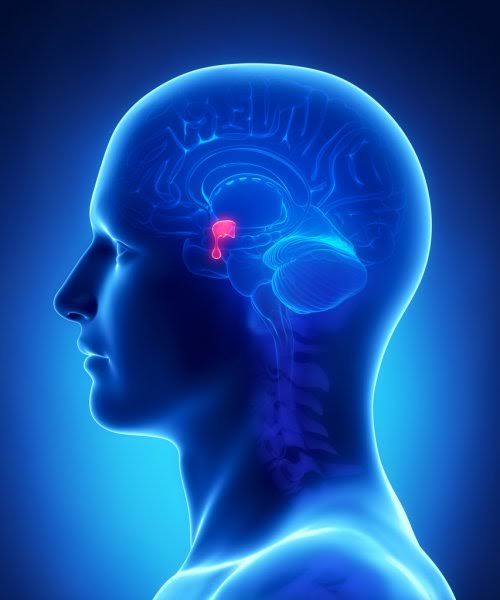Hormonal Imbalance: Pituitary Gland (Part I)
Dr. Surendra G. Gattani
This series will discuss several body glands and their roles in health, as well as how to keep them healthy to prevent hormonal imbalances. The three Ps glands (pituitary, pineal, and pancreatic) play important roles in health.
The hypophysis, or pituitary gland, is an endocrine gland that produces several vital hormones and regulates the majority of the functions of the body. It is around the size of a pea and weighs 0.5 grams in humans. The size of the gland is irrelevant, yet it regulates the majority of the body’s essential processes.
 Statistical Data
Statistical Data
1)Approximately 27.5 million married couples struggle with infertility.
2) Studies suggest that 42 million people in India suffer from thyroid disorders. The five most prevalent thyroid illnesses in India are hypothyroidism, hyperthyroidism, thyroid cancer, and Hashimoto’s thyroiditis.
3) Brain development occurs up to the age of 14, whereas height growth occurs up to 18 years. High levels of child undernutrition and bad lifestyle have been a continuous concern in India, causing retardation of brain development and height of children.
4) Statistics indicate that 80 percent of women experience hormonal abnormalities. This statistic demonstrates how health is worsening due to the modern lifestyle.
The function:
It regulates the kidney, breast, bone, testicles, ovaries, thyroid, skin, adrenal cortex, muscle, growth, temperature regulation, autonomic nervous system regulation, fluid balance, hunger control, and milk production via hormones.
Hormones:
Thyroid-stimulating hormone (TSH), adrenocorticotropic hormone (ACTH), luteinizing hormones (LH), growth hormone (GH), prolactin, antidiuretic hormone (ADH), and oxytocin, and indirectly responsible for melanin secretion.
Hormone imbalance
Nowadays, modern lifestyles include nutrition-deficient food, processed and packaged food, sleep deprivation, excessive and unnecessary use of medicine, consumption of pesticide- and fertilizer-containing foods, excessive use of cosmetics and lack of exercise, and mental and social instability responsible for hormone imbalance mostly in women
Endocrine-disrupting chemicals (EDCs):
EDCs can disrupt the endocrine system. They can be natural or synthetic compounds and are found in a variety of products. Some well-known EDCs include bisphenol A, phthalates, phytoestrogens, per- and polyfluoroalkyl compounds, atrazine, and dioxins.
Many people suffer from hormone abnormalities, such as irregular menstruation, weight gain, and decreased growth. Hair loss, mood swings, infertility, thyroid problems, polycystic ovary syndrome, and night sweats. Acne, Fatigue, Depression, Dry skin Vaginal dryness and menorrhagia Decreased Libido Breasts alter, Constipation, hirsutism, obesity Primary ovarian insufficiency, and stress
How to Care for the Pituitary Gland Step by Step?
The pituitary gland is the master gland and is very important in performing many functions of the body; so the question is what efforts we are taking to preserve the health of the pituitary gland in the form of diet, sleep, and exercise (sleep will cover in the pineal gland).
Food: A plant-based diet rich in fruits and vegetables, whole grains, lean proteins, healthy fats, polyphenols, omega-3 fatty acids, vitamins D, B6, C, E, thiamine, vitamin B12, selenium, and zinc.
Yoga and Pranayama:
Suryanamaskar, Sarvangasana, Sirsasana, Halasana, Forward and Backward Bending, Mandukaasan, Pavanmuktaasan, Uttanpadasan, Yogmudraasan, and Matsyasana are some of the most significant yogasanas.
Duration: 1–2 minutes.
Pranayamas: Bhastrika, Kapalbhati, Anulom Vilom, Bhramari, Shitali, and Ujjayi. The duration of the yoga practice is determined by the yoga master.
Herbs: The herbs used include Ashwagandha, Shilajit, Shatavari, Gokhru, Brahmi, Liquorice, Amla, and Triphala.
The majority of the body’s functions are controlled by the tiniest master gland. If we do not take sufficient care by altering our bad habits, it will lose its ability to secret hormones, resulting in infertility, thyroid problems, and delayed physical and mental growth in children. I wanted to live joyfully and take care of the pituitary gland by practicing yoga, and pranayama, and eating nourishing foods and herbs. Take care; The Arogyam is with you.
This blog is dedicated to daughters, sisters, mothers, and all the wonderful women in the world.
Happy Raksha Bandhan !!
The author is a Senior professor at the School of Pharmacy, Swami Ramanand Teerth Marathwada University, Nanded
Very informative sir
Beautiful Insights
Very Informative……
Very nice information for all women…
This Hormonal imbalance series will be interesting for students of Pharmacy and other’s too.
Thanks for Providing Such a Valuable Information Sir..
Thank you sir for valuable information
Providing information about the endocrine glands is a good initiative sir… useful information..!!
Very informative..!!! Thank you
Great sharing of knowledge… Keep it up Sir ji
Great topic…